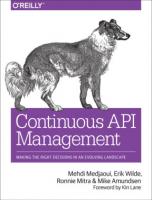Writing API Tests with Karate: Enhance your API testing for improved security and performance 9781837638260
Unlock the full potential of Karate with this comprehensive guide to effortlessly setup, write, run, optimize, and repor
281 27 10MB
English Pages 326 Year 2023
Table of contents :
Preface
Part 1: Karate Basics
1
Introducing Karate’s Core Concepts
Technical requirements
What makes Karate stand out?
Discovering Karate’s strong points
Core features
BDD versus Karate
What is BDD?
Glue code
The Karate way
Supported data types in Karate
JSON
GraphQL
XML
YAML
CSV
Other text-based formats
Binary formats
The JavaScript engine
Java interoperability
Summary
2
Setting up Your Karate Project
Technical requirements
Installing Java
Setting the JAVA_HOME environment variable
Getting to know Karate standalone
Preparing the IDE
Setting up Visual Studio Code
Setting up IntelliJ IDEA
Importing the example project
Setting up Karate projects with Maven
What is Maven?
Installing Maven
Adding Maven to the PATH variable
Setting up a Karate project with the Maven archetype
The roles of the different Karate project files
Summary
3
Writing Basic Karate Tests
Technical requirements
Exploring the API under test
The JSONPlaceholder API
Creating a new Karate project
Adding a new feature file
Configuring test runs
Adding a scenario
Calling endpoints and setting parameters
Setting a URL
Specifying the HTTP method
Separating the base URL from the path
Setting query parameters
Matching status codes and responses
Matching the status code and type
Making the test fail
Using assertions and matchers on the response
Exploring the response variable
Handling nested JSON elements
Asserting the number of elements with the length property
Using matchers
Making requests with payloads
Using variables and data tables
Using variables
Using data tables
Using a set
Summary
Running Karate Tests
Technical requirements
Running and debugging Karate tests through the IDE
Running via CodeLens and the Karate CLI
Debugging via CodeLens and Karate standalone
Using the debug server
Running tests with Maven
Understanding Karate runners
Running tests against different environments
Using a custom property in a feature file
Using Karate’s environment property
Setting up karate-config.js
Running specific tests
Running specific runner class methods
Running specific scenarios
Filtering tests by tags
Summary
5
Reporting and Logging
Technical requirements
Configuring log options
Understanding log levels
Changing the log level
Suppressing print
Using Karate’s built-in reports
The different report pages
Preserving old reports
Deciding what to report
Configuring third-party report libraries
Setting the appropriate Karate options
Using Cluecumber as a Maven plugin
Technical requirements
Using Cluecumber from a Karate runner
Generating a Surefire report
Surefire XML
Using JUnit reports
Summary
Part 2: Advanced Karate Functionalities
6
More Advanced Karate Features
Technical requirements
Working with headers and cookies
More about headers
Setting headers
More about cookies
Using different configuration and run options
Using the karate object for configuration and execution
Request retries
Using advanced tags
Defining and using expressions with def
Defining inline methods
Using embedded expressions with JSON
Using embedded expressions with XML
Working with external files
Understanding JSONPath and XPath
Testing GraphQL
Understanding GraphQL requests
Exploring the mock API
Using GraphQL in Karate
Collecting data into a new array
Summary
7
Customizing and Optimizing Karate Tests
Technical requirements
Using Karate hooks
Implementing a new hook class
Overriding handler methods
Registering a hook class in the runner
Running a test using the hook class
Defining hooks inside feature files
Defining and calling Java functions
Understanding the basics
Working with databases
Using Karate as a mock server
Authoring a mock scenario
Firing up the mock server from within a test
Using a standalone mock server
Making your tests more concise
Reducing code by calling other feature files
Data-driven tests with scenario outline
Avoiding code duplication with background scenarios
Summary
8
Karate in Docker and CI/CD pipelines
Technical requirements
Triggering Karate tests from shell scripts
Creating a batch script for Windows
Creating a Bash script
Running Karate tests in a Docker container
Understanding Docker
Installing Docker
Starting and verifying a Docker installation
Downloading a Docker image
Running a Maven command in a Maven Docker container
Running Karate tests inside a Maven Docker container
Running our shell script inside Docker
Customizing our tests
Passing database credentials as system properties
Using the system properties in the database connection class
Passing parameters from Docker
Environment variables
Integrating Karate tests into GitHub workflows
Understanding GitHub workflows
Managing secrets
Adding a GitHub workflow to a repository
Setting up the Docker-based GitHub workflow
Using Karate in a GitHub workflow without Docker
Summary
9
Karate UI for Browser Testing
Technical requirements
What Karate UI is for
Related testing capabilities
Writing a basic Chrome scenario
Opening a website in Chrome
Finding and interacting with elements
Understanding locators
Knowing the different kinds of locators
Determining element locators
Interacting with elements
Using interactions in a test scenario
Making web element assertions
Making web element list assertions
Debugging UI tests
Taking screenshots
Highlighting elements
Exporting PDFs
Using the debugger
Using karate.stop to pause execution
Redirecting HTTP calls
Investigating API requests
Adding a mock response
Configuring the mock
Using the mock in a test
Summary
10
Performance Testing with Karate Gatling
Technical requirements
Creating the test scenario
What is Gatling?
Setting up Karate Gatling
Setting up Scala in VS Code
Creating Maven profiles
Running Karate tests as performance tests
Creating a simulation
Running the simulation
Using tags
Testing different simulations
Gatling assertions
Checking out Gatling reports
Summary
Index
Other Books You May Enjoy
Preface
Part 1: Karate Basics
1
Introducing Karate’s Core Concepts
Technical requirements
What makes Karate stand out?
Discovering Karate’s strong points
Core features
BDD versus Karate
What is BDD?
Glue code
The Karate way
Supported data types in Karate
JSON
GraphQL
XML
YAML
CSV
Other text-based formats
Binary formats
The JavaScript engine
Java interoperability
Summary
2
Setting up Your Karate Project
Technical requirements
Installing Java
Setting the JAVA_HOME environment variable
Getting to know Karate standalone
Preparing the IDE
Setting up Visual Studio Code
Setting up IntelliJ IDEA
Importing the example project
Setting up Karate projects with Maven
What is Maven?
Installing Maven
Adding Maven to the PATH variable
Setting up a Karate project with the Maven archetype
The roles of the different Karate project files
Summary
3
Writing Basic Karate Tests
Technical requirements
Exploring the API under test
The JSONPlaceholder API
Creating a new Karate project
Adding a new feature file
Configuring test runs
Adding a scenario
Calling endpoints and setting parameters
Setting a URL
Specifying the HTTP method
Separating the base URL from the path
Setting query parameters
Matching status codes and responses
Matching the status code and type
Making the test fail
Using assertions and matchers on the response
Exploring the response variable
Handling nested JSON elements
Asserting the number of elements with the length property
Using matchers
Making requests with payloads
Using variables and data tables
Using variables
Using data tables
Using a set
Summary
Running Karate Tests
Technical requirements
Running and debugging Karate tests through the IDE
Running via CodeLens and the Karate CLI
Debugging via CodeLens and Karate standalone
Using the debug server
Running tests with Maven
Understanding Karate runners
Running tests against different environments
Using a custom property in a feature file
Using Karate’s environment property
Setting up karate-config.js
Running specific tests
Running specific runner class methods
Running specific scenarios
Filtering tests by tags
Summary
5
Reporting and Logging
Technical requirements
Configuring log options
Understanding log levels
Changing the log level
Suppressing print
Using Karate’s built-in reports
The different report pages
Preserving old reports
Deciding what to report
Configuring third-party report libraries
Setting the appropriate Karate options
Using Cluecumber as a Maven plugin
Technical requirements
Using Cluecumber from a Karate runner
Generating a Surefire report
Surefire XML
Using JUnit reports
Summary
Part 2: Advanced Karate Functionalities
6
More Advanced Karate Features
Technical requirements
Working with headers and cookies
More about headers
Setting headers
More about cookies
Using different configuration and run options
Using the karate object for configuration and execution
Request retries
Using advanced tags
Defining and using expressions with def
Defining inline methods
Using embedded expressions with JSON
Using embedded expressions with XML
Working with external files
Understanding JSONPath and XPath
Testing GraphQL
Understanding GraphQL requests
Exploring the mock API
Using GraphQL in Karate
Collecting data into a new array
Summary
7
Customizing and Optimizing Karate Tests
Technical requirements
Using Karate hooks
Implementing a new hook class
Overriding handler methods
Registering a hook class in the runner
Running a test using the hook class
Defining hooks inside feature files
Defining and calling Java functions
Understanding the basics
Working with databases
Using Karate as a mock server
Authoring a mock scenario
Firing up the mock server from within a test
Using a standalone mock server
Making your tests more concise
Reducing code by calling other feature files
Data-driven tests with scenario outline
Avoiding code duplication with background scenarios
Summary
8
Karate in Docker and CI/CD pipelines
Technical requirements
Triggering Karate tests from shell scripts
Creating a batch script for Windows
Creating a Bash script
Running Karate tests in a Docker container
Understanding Docker
Installing Docker
Starting and verifying a Docker installation
Downloading a Docker image
Running a Maven command in a Maven Docker container
Running Karate tests inside a Maven Docker container
Running our shell script inside Docker
Customizing our tests
Passing database credentials as system properties
Using the system properties in the database connection class
Passing parameters from Docker
Environment variables
Integrating Karate tests into GitHub workflows
Understanding GitHub workflows
Managing secrets
Adding a GitHub workflow to a repository
Setting up the Docker-based GitHub workflow
Using Karate in a GitHub workflow without Docker
Summary
9
Karate UI for Browser Testing
Technical requirements
What Karate UI is for
Related testing capabilities
Writing a basic Chrome scenario
Opening a website in Chrome
Finding and interacting with elements
Understanding locators
Knowing the different kinds of locators
Determining element locators
Interacting with elements
Using interactions in a test scenario
Making web element assertions
Making web element list assertions
Debugging UI tests
Taking screenshots
Highlighting elements
Exporting PDFs
Using the debugger
Using karate.stop to pause execution
Redirecting HTTP calls
Investigating API requests
Adding a mock response
Configuring the mock
Using the mock in a test
Summary
10
Performance Testing with Karate Gatling
Technical requirements
Creating the test scenario
What is Gatling?
Setting up Karate Gatling
Setting up Scala in VS Code
Creating Maven profiles
Running Karate tests as performance tests
Creating a simulation
Running the simulation
Using tags
Testing different simulations
Gatling assertions
Checking out Gatling reports
Summary
Index
Other Books You May Enjoy

- Author / Uploaded
- Benjamin Bischoff



![API Testing and Development with Postman - Second Edition: API creation, testing, debugging, and management made easy [2 ed.]
1804617903, 9781804617908](https://ebin.pub/img/200x200/api-testing-and-development-with-postman-second-edition-api-creation-testing-debugging-and-management-made-easy-2nbsped-1804617903-9781804617908.jpg)





